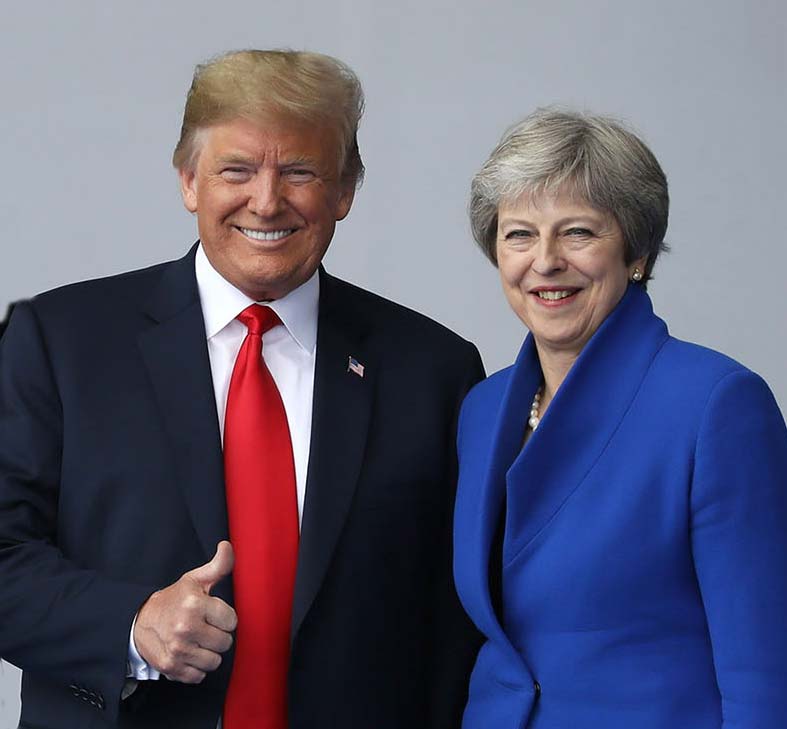 Marlene Awaad for Bloomberg
Marlene Awaad for Bloomberg
But he may be in for a surprise when he lands here Thursday. In recent days, British politics has gone crazy, and the prime minister, Theresa May, is in grievous peril of blowing her government to pieces.
Her foreign secretary, the ebullient Boris Johnson, has quit in a flurry of expletives. Other ministers have resigned in fury, including the most experienced member of May's cabinet, David Davis. The prime minister faces having to rely on opposition parties' votes to get her policies through Parliament.
When Trump stands next to May on Friday at Chequers, her official country residence, it is therefore the American leader who seems more likely to radiate stability and levelheadedness. Doughty Donald the Durable!
May was the first foreign leader to visit the Trump White House, in early 2017. Back then she was regarded as the insuperable leader of her nation's politics.
In a June 2016 referendum, Britons had unexpectedly voted to leave the European Union, and the then-premier, suave David Cameron, who had opposed this "Brexit," promptly resigned. May was appointed to succeed him without a vote by her Conservative Party's activists. She swept into power on a theory that her low-key (another way of saying dull) managerialism was just what Britain needed.
The slogan that helped Brexiteers win the referendum was "take back control," meaning that Britain would retrieve independent command of its laws and borders rather than pool its sovereignty with the 27 other countries of the increasingly federal E.U. That might complicate trade within the E.U., but it would allow Britain to establish free-trade deals with the non-E.U. world, including China, India and the United States.
In June last year, May sought to increase her clout by calling an unscheduled general election. She thought she would thrash her main opponent, the Labour Party's veteran left-winger Jeremy Corbyn. She was wrong.
Though she scraped home in that election, the prime minister lost her parliamentary majority. She goofed.
If Brexit hypnotized London a year ago, it has since sent British politics into an acidic, all-consuming frenzy. The people voted "leave," but the political elite wanted to "remain" --- and the elite has stymied the referendum result and grumbled every inch of the way. Previously phlegmatic Brits became distinctly antsy with each other.
Critics of London's Brexit plan say it has been waffly and unrealistic, seeking to keep the tariff-free and customs advantages of E.U. membership, which facilitate industrial supply chains, while demanding an end to more onerous aspects, such as multibillion-pound annual payments by Britain to Brussels and freedom of movement for people. The British government has not been frank in explaining some of these realities to the voters.
Brexit supporters accuse "Remainers" of being "Remoaners" - i.e., wailing about calamities they fear will ensue from leaving the E.U.'s regulatory/protectionist club. Major British institutions, from the judiciary and Parliament to big business, the BBC and the civil service, are regarded as being in the Remainers' grip. The prime minister herself was in 2016 a Remain supporter, although after the referendum May minted the slogan "Brexit means Brexit" and said she would honor the results of a referendum that had brought out more than 72 percent of eligible voters.
The longer May has been prime minister, the weaker she has become.
Though Brexit is now on the statute book after a squeaker of a parliamentary vote, on Friday last week, May made major concessions in Britain's much-delayed "divorce negotiations" with the E.U. Brexit Britain was looking forward to talking to Trump about a whizzo Anglo-American trade deal, but May's cave-ins to the E.U. (which Brussels might yet refuse to accept) could wreck that. Again, she goofed.
Conservative Party members and members of Parliament have long, and stoically, put up with a zestless, mechanical May. Her policy shift last week, which could mean Britain's remaining in hock to the E.U.'s rules, has cracked the patience of many former supporters, and the mood in her party is molten.
Many now look to the custardy-haired, mercurial Johnson - an ardent Brexiteer who has spoken warmly of Trump - to lead resistance not only to May's timid Brexit proposals but also to her wider capitulation. They feel she has surrendered the much-promised British independence to a handful of multinational firms who want to keep the E.U.'s regulatory controls. They think she is the conspiring helpmeet of a liberal, almost Clintonesque establishment in charge of the country's institutions.
Trump may not recognize many of the faces of those involved, but the cultural-political ground should make him feel right at home.
Letts is a political columnist and theater critic for the Daily Mail and the author, most recently, of "Patronising Bastards: How the Elites Betrayed Britain."


 Contact The Editor
Contact The Editor
 Articles By This Author
Articles By This Author